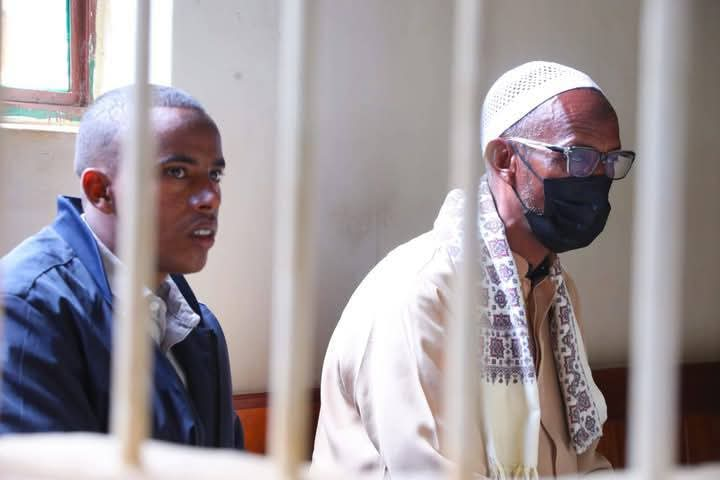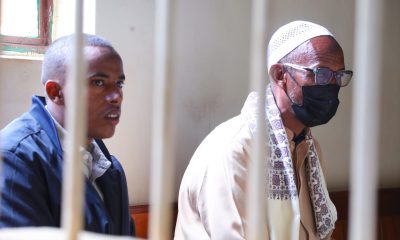Investigations
Two Men Sentenced to Decades in Prison for Role in Deadly Dusit D2 Terror Attack
The victims included at least 21 people, including one U.S. citizen, among them American national Jason Spindler, whose father Joseph delivered a powerful victim impact statement to the court.

NAIROBI, Kenya – A Kenyan court has sentenced two men to lengthy prison terms for their role in facilitating the devastating January 2019 terrorist attack on the Dusit D2 Hotel Complex in Nairobi that claimed 21 lives.
The Kahawa Anti-Terror Court on Thursday sentenced Mohamed Abdi Ali, a 61-year-old madrassa teacher, to 30 years’ imprisonment, while Hussein Mohamed Abdille Ali, 22, received a 30-year sentence for their roles in supporting the al-Shabaab attack that shocked Kenya’s capital.
On January 15, 2019, al-Shabaab gunmen armed with explosives, automatic weapons, and grenades attacked the DusitD2 commercial center, a six-building complex of shops, offices, and a hotel in Nairobi’s affluent Westlands neighborhood.
The attack lasted nearly 20 hours, with more than 700 people safely evacuated during the siege.
The victims included at least 21 people, including one U.S. citizen, among them American national Jason Spindler, whose father Joseph delivered a powerful victim impact statement to the court.
“Your Honor, I’m not here for revenge but for justice,” Joseph Spindler told the court. “Jason was a survivor, a doer, and a visionary. He deserved a future, not a grave marked by the shrapnel from a terrorist’s suicide vest.”
Lady Justice Diana Kavedza ruled that the prosecution had proved its case against both defendants beyond reasonable doubt.
The court traced mobile money transfers totaling KSh 836,000 (approximately $6,500) to al-Shabaab, establishing a clear financial link between the accused and the terrorist organization.
Mohamed Abdi Ali received 15 years for each of 14 charges of facilitating a terrorist act, running concurrently, plus an additional 15 years for conspiracy to commit an offense under Kenya’s Prevention of Terrorism Act.
Hussein Mohamed Abdille Ali was sentenced to 15 years for conspiracy and another 15 years for facilitation, to be served consecutively.
The prosecution, led by Assistant Director of Public Prosecutions Duncan Ondimu and a team of Principal Prosecution Counsels, presented testimony from 45 witnesses that proved crucial in securing the convictions.
The court heard harrowing accounts of the attack’s continuing impact on survivors and the broader community.
One survivor still has bullets lodged in his body, leading to ongoing medical complications and substantial financial strain from medical bills.
The attack devastated the Dusit D2 complex economically.
Before the assault, the facility enjoyed 100% occupancy with approximately 2,500 daily visitors.
Post-attack, occupancy plummeted to 55% with only about 200 daily visitors, affecting employees who had previously benefited from enhanced income through salaries, bonuses, and incentives.
Justice Kavedza noted that the case represented “one of the most comprehensive counter-terrorism investigations in Kenya’s history, as law enforcement agencies pursued not only the attackers’ immediate associates but also financiers, facilitators and logistical coordinators who enabled the attack.”
The Director of Public Prosecutions had urged the court to impose maximum sentences running consecutively, arguing for a deterrent effect against future acts of terrorism and to demonstrate the justice system’s commitment to holding perpetrators accountable.
Al-Shabaab, an affiliate of the al-Qaeda terrorist organization, has repeatedly targeted Kenya in retaliation for the country’s military involvement in Somalia.
The U.S. State Department’s Rewards for Justice program has offered up to $10 million for information on Mohamoud Abdi Aden and other individuals responsible for the attack.
The Dusit D2 attack marked one of the most significant terrorist incidents in Nairobi since the 2013 Westgate shopping mall attack, which killed 67 people.
In delivering her judgment, Justice Kavedza acknowledged the enduring trauma faced by Kenyans.
“Kenyans remember the fear, the pain, and the trauma, but importantly, the courage of the victims who lost their dear and loved ones, those who lost their jobs, their businesses and those that still bear the physical scars,” she said.
The court emphasized that the judgment “spoke for the survivors who deserve closure.”
According to the Directorate of Criminal Investigations, the convictions represent “a key milestone in efforts to combat terrorism and dismantle terror networks across the country.”
Kenya Insights allows guest blogging, if you want to be published on Kenya’s most authoritative and accurate blog, have an expose, news TIPS, story angles, human interest stories, drop us an email on [email protected] or via Telegram
-

 Grapevine2 weeks ago
Grapevine2 weeks agoRussian Man’s Secret Sex Recordings Ignite Fury as Questions Mount Over Consent and Easy Pick-Ups in Nairobi
-

 News1 week ago
News1 week agoTHE FIRM IN THE DOCK: How Kaplan and Stratton Became the Most Scrutinised Law Firm in Kenya
-

 Investigations1 week ago
Investigations1 week agoMulti-Million Dollar Fraud: Three Kenyans Face US Extradition in Massive Cybercrime Conspiracy
-

 Economy1 week ago
Economy1 week agoIran Demands Arrest, Prosecution Of Kenya’s Cup of Joe Director Director Over Sh2.6 Billion Tea Fraud
-

 Business1 week ago
Business1 week agoA Farm in Kenya’s Rift Valley Ignites a National Reckoning With Israeli Investment
-

 Africa2 weeks ago
Africa2 weeks agoFBI Investigates Congresswoman Ilhan Omar’s Husband’s Sh3.8 Billion Businesses in Kenya, Somalia and Dubai
-

 Grapevine4 days ago
Grapevine4 days agoA UN Director Based in Nairobi Was Deep in an Intimate Friendship With Epstein — He Even Sent Her a Sex Toy
-

 Politics2 weeks ago
Politics2 weeks agoSifuna, Babu Owino Are Uhuru’s Project, Orengo Is Opportunist, Inconsequential in Kenyan Politics, Miguna Says


















